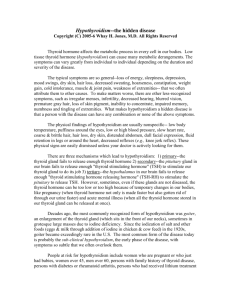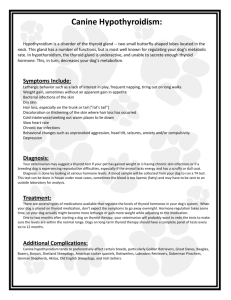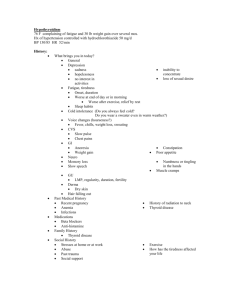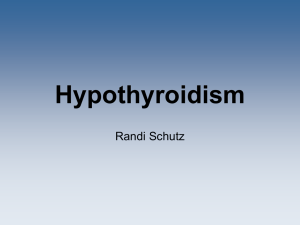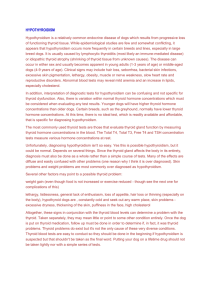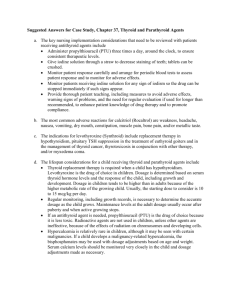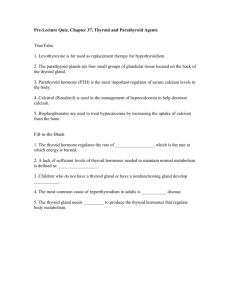hypothyroidism - Hormone Health Network
advertisement
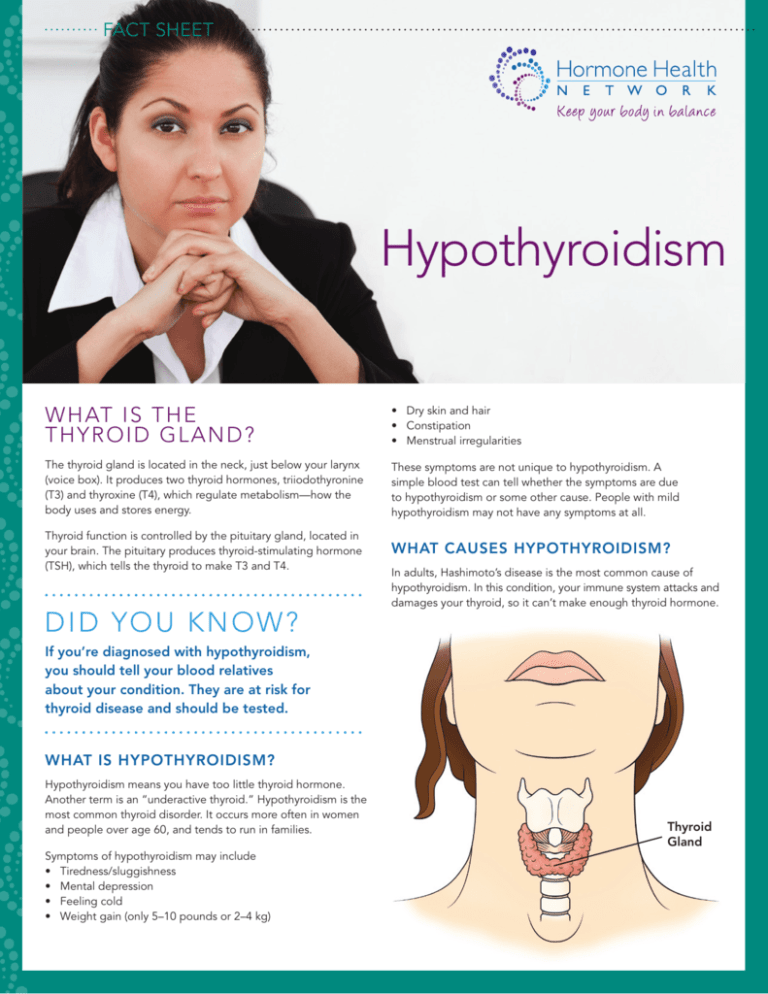
Fact Sheet Hypothyroidism W h at i s t he t hy ro i d g land? • Dry skin and hair • Constipation • Menstrual irregularities The thyroid gland is located in the neck, just below your larynx (voice box). It produces two thyroid hormones, triiodothyronine (T3) and thyroxine (T4), which regulate metabolism—how the body uses and stores energy. These symptoms are not unique to hypothyroidism. A simple blood test can tell whether the symptoms are due to hypothyroidism or some other cause. People with mild hypothyroidism may not have any symptoms at all. Thyroid function is controlled by the pituitary gland, located in your brain. The pituitary produces thyroid-stimulating hormone (TSH), which tells the thyroid to make T3 and T4. What causes hypothyroidism? D i d y o u know? In adults, Hashimoto’s disease is the most common cause of hypothyroidism. In this condition, your immune system attacks and damages your thyroid, so it can’t make enough thyroid hormone. If you’re diagnosed with hypothyroidism, you should tell your blood relatives about your condition. They are at risk for thyroid disease and should be tested. What is hypothyroidism? Hypothyroidism means you have too little thyroid hormone. Another term is an “underactive thyroid.” Hypothyroidism is the most common thyroid disorder. It occurs more often in women and people over age 60, and tends to run in families. Symptoms of hypothyroidism may include • Tiredness/sluggishness • Mental depression • Feeling cold • Weight gain (only 5–10 pounds or 2–4 kg) Thyroid Gland Hypothyroidism can also be caused by radioactive iodine treatment or surgery on the thyroid gland, which are used to treat other types of thyroid disorders. A problem with the pituitary gland is another rare cause. Hypothyroidism can also be present from birth if the thyroid gland does not develop properly. How can hypothyroidism affect your health? In adults, untreated hypothyroidism leads to poor mental and physical performance. It also can cause high blood cholesterol levels that can lead to heart disease. A life-threatening condition called myxedema coma can develop if severe hypothyroidism is left untreated. Diagnosis of hypothyroidism is especially important in pregnancy. Untreated hypothyroidism in the mother may affect the baby’s growth and brain development. All babies are tested at birth for hypothyroidism. If not treated promptly, a child with hypothyroidism could have mental retardation or fail to grow normally. How is hypothyroidism diagnosed? Blood tests can measure your levels of thyroid-stimulating hormone (TSH) and thyroid hormone (T4). You have hypothyroidism when you have high TSH and low T4 levels in your blood. In very early or mild hypothyroidism, TSH will be high but T4 may be normal. In this case, your doctor will pay more attention to TSH levels to make a diagnosis. When the cause of hypothyroidism is Hashimoto’s disease, blood tests can detect anti-thyroid antibodies that attack the thyroid. Most people need thyroid hormone replacement for life. If the brand or dosage needs to be changed, you should have blood tests for TSH done again. Your dose will be adjusted based on your TSH tests. Over time, doses of thyroid hormone that are too high can lead to bone loss, abnormal heart function, and abnormal heart rhythms. Doses that are too low may not relieve your symptoms. Dose adjustment may be necessary over your lifetime, including during pregnancy. You can discuss dose changes during your regular check-ups with your doctor. How will you know if you should get tested? If you have one or more of the symptoms of hypothyroidism, or if thyroid disease runs in your family, ask your doctor if you should have a blood test. Some experts also recommend testing in early pregnancy or in women who want to become pregnant. Doctors may also recommend testing in women over the age of 60, even if they don’t have symptoms. If you are diagnosed with hypothyroidism, you will need treatment to avoid serious health problems. Questions to ask your doctor • Do I have hypothyroidism? • What treatment do I need for it? • What are the risks and benefits of each of my treatment options? • How often should I be retested? • Should I see an endocrinologist? How is hypothyroidism treated? Resources Hypothyroidism is treated with thyroid hormone medication, taken as a pill. Levothyroxine is the drug of choice. It is a synthetic (laboratory-made) form of T4 that is identical to the T4 the thyroid naturally makes. Levothyroxine comes in brand-name and generic versions. • Find-an-Endocrinologist: www.hormone.org or call 1-800-HORMONE (1-800-467-6663) • Hormone Health Network information about thyroid disorders: www.hormone.org/thyroid/index.cfm • MedlinePlus (National Institutes of Health-NIH): —— www.nlm.nih.gov/medlineplus/thyroiddiseases.html —— www.nlm.nih.gov/medlineplus/ency/article/000353.htm • National Endocrine and Metabolic Diseases Information Service (NIH): www.endocrine.niddk.nih.gov/pubs/ Hypothyroidism • Mayo Clinic: www.mayoclinic.com/health/hypothyroidism/ DS00353 • American Thyroid Association: www.thyroid.org Different kinds of generics may have different ingredients. These differences can affect the dose of thyroid hormone your body absorbs. To make sure you get the same dose every time, you should use a brand-name if possible. If your prescription is for a generic product, try to get levothyroxine from the same generic manufacturer with every refill. Editors David Cooper, MD Michael McDermott, MD Leonard Wartofsky, MD The Hormone Health Network offers free, online resources based on the most advanced clinical and scientific knowledge from The Endocrine Society (www.endo-society.org). The Network’s goal is to move patients from educated to engaged, from informed to active partners in their health care. This fact sheet is also available in Spanish at www.hormone.org/Spanish. March 2010, 4th Edition Hypothyroidism Fact Sheet www.hormone.org


